
The Growing Economic Partnership – UAE and Turkey

Introduction
The economic relations between the United Arab Emirates (UAE) and Turkey have evolved significantly over the years, transforming into a mutually beneficial partnership that spans various sectors. This relationship, which began with diplomatic exchanges and trade agreements, has grown into a robust economic cooperation marked by high levels of trade, investments, and strategic agreements.
In this article, we will delve into the history and current state of UAE-Turkey economic relations, examining trade statistics, major seaports and airports in both countries, shipping routes, and the Comprehensive Economic Partnership Agreement (CEPA) signed in 2023. This multifaceted collaboration serves as a testament to the commitment of both nations to foster joint growth and seize opportunities for cooperation.
History of United Arab Emirates and Turkey Economic Relations
The Turkey opened their embassy in UAE in 1979, while UAE opened the first embassy in 1983 in Ankara. The bilateral cooperation between the two countries started in 1984 with the Economic & Technical Cooperation Agreement. Later in 1993, both nations signed an agreement to avoid double taxation. However, the economic development experienced remarkable growth after 2005, when several UAE companies entered the Turkish market. Since 2007, the UAE Capital Towers Group has invested over USD 900 million in Turkey.
Till 2015, the strength of economic relations between the two nations was mostly developed at the level of Arab Gulf states; however, the visit of Turkish Foreign Minister, Mevlut Cavusoglu, to the Emirates in 2016 laid the foundation for development in all areas. This step helped the trade between the two countries to reach USD 9 billion.
The relations between UAE and Turkey are continuously witnessing development in vital sectors, showcasing the commitment of both countries to develop joint work and create more opportunities for corporation.
Trade Statistics
The trade between the two countries increased by 40% in comparison to the previous year, 2021. The reports indicated that the non-oil export reached the value of USD 5.6 billion, which shows an increase of 109% in comparison to 2022; whereas the value of re-export from UAE to the world grew by 87% in 2022 and reached the value of USD 2.3 billion.
Turkey is an important trading partner for UAE and acts as an important gateway to reach European markets.
Economic Cooperation
The historic visit of UAE president, HH Sheikh Mohamed bin Zayed Al Nahyan, to Turkey in November 2021, and later the visit of President of Turkey, HE Recep Tayyip Erdogan in February 2022, reinforced the economic and trade relations of both countries. The trade exchange between the two nations was recorded at USD 8.9 billion in 2021. The government of UAE further announced an investment of USD 10 billion in the same year, focusing on the strategic investments in energy, health, and food sectors.
During the visit of 2021, 12 agreements and memorandums were signed between the two nations in different sectors, including health, industry, technology, climate change, trade and economy. Whereas, during the visit of 2022, 13 more agreements and memorandums were signed in various areas, including transportation, defense, agriculture, health and medical science, and tourism.
Current Agreements and Protocols between UAE and Turkey
Some of the agreements and protocols in place between the two nations include:
Agreement on Economic and Technical Cooperation | Political Consultancy Agreement between Foreign Ministers of UAE and Turkey |
Agreement on Military Cooperation | Cooperation Agreement between Turkish Central Bank and its UAE counterpart. |
Bilateral Agreement between Abu Dhabi Authority for Culture & Heritage and Turkey’s Tourism & Culture Ministry | MoU of Financial Security Exchange in the Context of Combating Money Laundering and Terrorist Financing |
Agreement on Bilateral Cultural Cooperation | MoU for Cooperation between Abu Dhabi Stock Exchange and Istanbul Stock Exchange |
Know-how Transfer & Bilateral Cooperation Agreement Between Money Markets of Both Countries | MoU between the Abu Dhabi Development Holding Company and Presidential Investment Authority in Turkey |
Agreement on Avoidance of Double Taxation | Administrative Cooperation and Partnership Agreement on Matters Related to Customs Between Both Countries |
Agreement on Dual Council Establishment | MoU in Cooperation in Environment |
Agreement of Air Transportation between UAE and Turkey | MoU on Cooperation on Energy |
Agreement of Bilateral Visa Exemption for Person with Diplomatic Passport | MoU between Abu Dhabi Development Holding Company and Turkish Sovereign Fund |
MoU between Abu Dhabi Port Company and Turkish Sovereign Fund |
|
UAE-Turkey's Comprehensive Economic Partnership Agreement (CEPA)

On 3rd March 2023, the government of UAE and Turkey signed CEPA agreement that will increase the non-oil bilateral trade between the two countries by USD 40 billion annually for the next five years. The agreement will be implemented in the second quarter of 2023 that will spur the trade and investment opportunities, as well as stimulate sustainable and long-term economic growth by reducing or eliminating the customs duties.
The agreement will also encourage a partnership that boosts the common interest of both nations and strengthens strategic relations. The primary focus of the agreement will be on:
- Clean Energy
- Construction & Real Estate
- Agri-Tech
- Food Security
Furthermore, the deal is expected to create more than 25,000 jobs in the UAE by 2031, especially the skilled labor, which will help in raising the UAE exports to Turkey by 21.7%.
Benefits of CEPA Agreement
The benefits of CEPA agreement between the two countries include:
- The agreement opens up new opportunities for sustainable growth and economic prosperity, creating new avenues for trade and investment.
- The tariffs will be reduced or eliminated on 82% of the goods and products and more than 93% of the components of intra-regional non-oil trade.
- The agreement aims to improve the market access to Turkey for UAE exports, particularly in the sectors like construction, polymers, metals, and other manufacturing goods.
- It will foster collaboration among small and medium-sized enterprises and entrepreneurs of both nations.
- It makes the region catalyst or central hub for international trade.
- The agreement promotes the free movement of goods, facilitating the capital flows and reducing trade barriers to improve the easiness of doing business in Turkey and vice versa.
- The agreement adds a level of certainty to economic recovery in the time of immense challenges, such as soaring inflation and food price volatility.
- Through the agreement, UAE is offering 100% foreign ownership of companies, flexible tax policies, easiness of doing business, and access to products and goods to Turkish companies who are operating in the UAE.
Why Invest in Turkey?
The top reasons to invest in Turkey include:
A Robust Economy
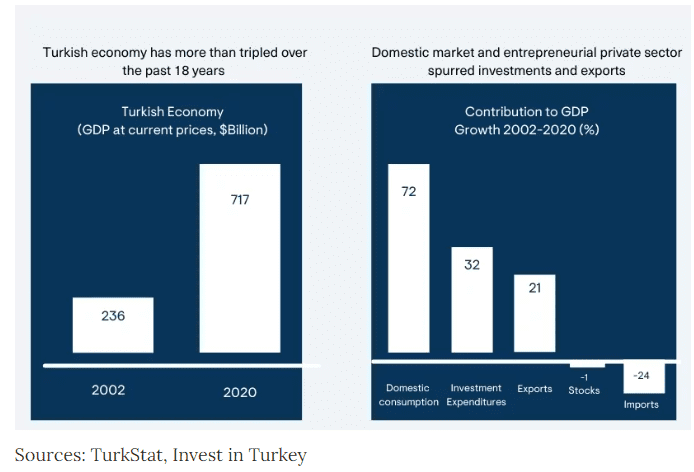
The Turkish economy has witnessed tremendous growth in the recent years. This robustness is mainly due to the diversified economic structure that includes manufacturing, agriculture, and services. The country was placed as the 18th strongest economy in the world in 2003; however, it jumped up the ranking and reached 11th place in 2022.
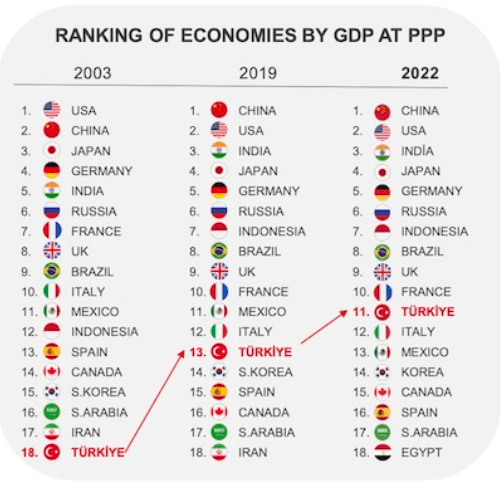
Strategic Location
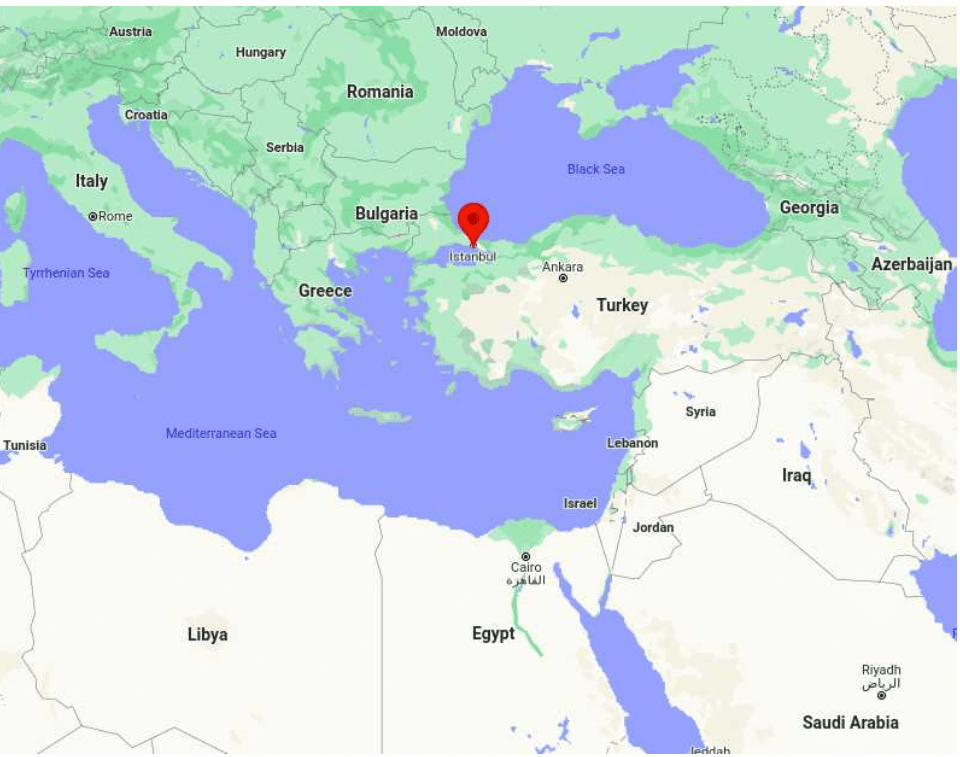
The strategic location of Turkey between Asia and Europe allows businesses to get access to a diverse market. The geographical location can also be leveraged by the real estate sector that attracts investors and tenants who consider Turkey to be a gateway to broader markets.
Beyond market access, the country’s location also makes it a logistics hub, which connects major international trade routes with working hours intersecting with 16 different time zones. This fact is especially beneficial for real estate companies because businesses seek locations that offer logistical benefits for distribution and supply chain management.
Skilled and Competitive Workforce

The young and educated population of Turkey is a valuable asset for investors, since they are facing challenges of aging population and shrinkage in other European countries. Also, the country has one of the lowest age dependency ratios in the region.
More than 6.7 million students are enrolled in universities and 800,000 of them are graduating annually. Based on IMD’s 2020 world talent report, skilled labor is one of the top strengths of Turkey, securing a ranking of 20 out of 64 countries.
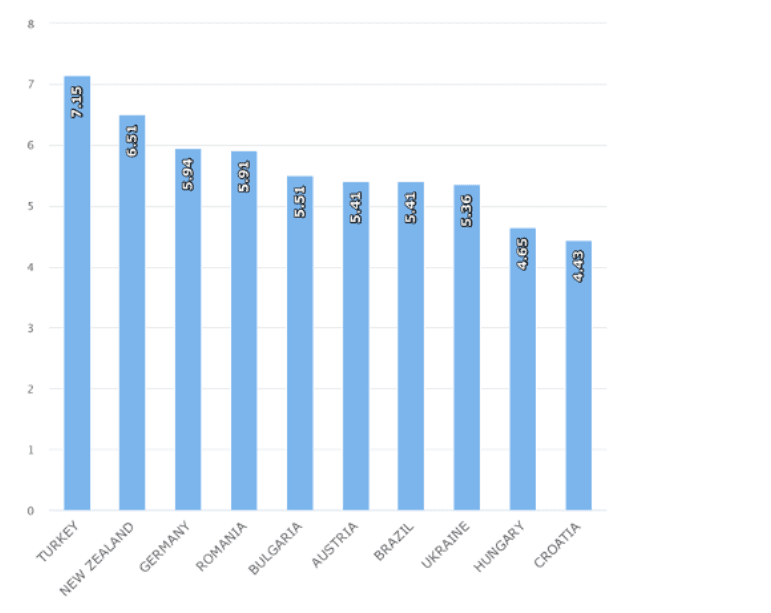
Skilled and Competitive Workforce
The Turkish government is aiming to encourage foreign investments by building incentive-based categories of assets that the professional investors can avail. According to Turkey’s Investment Office, quality FDI defines 7 profiles of investors, including:
- Investment reducing import dependency
- Investment that provides incentives for employment
- Investment providing high-quality employment
- Investment supporting digital transformation
- Investment in R&D, design, and innovation centers
- Export-oriented investments
The government of Turkey has designed many investments for 2021-2023 FDI strategies and are further improving to meet requirements and expectations of investors.
Sectoral Opportunities
The diverse economy of Turkey means that there are multiple sectors ripe for investment, such as automotive, infrastructure, finance, and energy. Furthermore, the real estate industry offers several opportunities, from industrial, commercial to tourism-related properties. The diverse sectors also allow for a more risk-balanced investment portfolio, offering options that can cater to different market conditions and preferences of investors.
Documents and Customs Clearance Required to Export to Turkey
Certain documents are required to ensure that the goods are properly accounted for. These documents should be completed before sending any cargo to Turkey and must be given to the customs upon arrival. Though, the documents may vary according to the type and value of the goods, the general ones required include:
- A commercial invoice
- Packing list
- Bill of lading
- Certificate of origin
In addition to these documents, custom duties and taxes must also be paid by the shippers in the Turkish currency; the amount may vary depending on the value of goods.
Banned Products
There are a number of items that are banned from being imported in the country. Some of them include port products, alcohol, weapons, and some drugs and pharmaceutical products. There are strict regulations in place to avoid the importation of such goods, and violation can result in serious penalties, including imprisonment.
Similarly, tobacco products are also banned for importation with the exception that it is intended for personal use. Finally, some food products might also have to go through rigorous inspection by customs before allowing them to enter the country.
Major Seaports and Airports in the UAE
UAE’s Seaports
The list of main UAE seaports include:
Port Khalifa
This port has an annual container capacity of 14.5 million TEUs and is considered to be one of the largest deepwater ports in the world. The port has the capability of handling different kinds of cargo, including containers, RoRo, general, liquid, gas, and dry bulk.
Port of Jebel Ali
This technologically advanced port in the Middle East is one of the largest worldwide with an annual container capacity of 19.3 million TEUs. The port is most famous for handling general cargo, as well as the temperature sensitive goods.
Port of Fujairah
The container capacity of the port is around 720,000 TEU. The port is strategically located in the new Strait of Hormuz. The Fujairah terminal is the only multi-purpose facility on the eastern seaboard, providing a key link between east-west trade routes. The port has the capability of handling general cargo, Ro-Ro, cruise, and containers.
Abu Dhabi Port
The Abu Dhabi port is a medium-sized commercial deep-water port that is located centrally on the Gulf Coast of the UAE. The port handles approximately 8.6 million tonnes of cargo annually; including bulk, containerized, and general cargo. Furthermore, the port has the capacity to store 15,000 TEUs of containerized cargo at once.
Port of Sharjah
The manmade port has the container capacity of 2,090 TEU and 21 deep-water berths to facilitate RoRo, containers, dry and liquid bulk, break bulk, car carrying, and passenger vessels.
Port of Ras Al Khaimah
The Port of Ras Al Khaimah has the capacity of handling more than 100 million tons of cargo annually. The port’s advanced facility allows easy handling of a wide range of commodities, including general cargo, containers, and breakbulk.
UAE’s Airports
Dubai international Airport
This is one of the busiest airports in the world that has the capacity of handling 3.3 million tonnes of cargo. Furthermore, the airport also has the capability of handling advanced cargo, including a specialized center for flowers and plants.
Abu Dhabi International Airport
This is the second busiest airport of the UAE that can process more than 1 million tonnes of air freight on an annual basis. This airport serves as a base for more than a hundred destinations across 56 countries.
Sharjah international Airport
This modern freight facility can handle livestock and temperature-sensitive cargo. The airport is located 13km southeast from Sharjah and has 5 dedicated cargo terminals.
Al Makhtoum International Airport
This is one of the main cargo aviation hubs in the region with 16 dedicated cargo terminals with a capacity of 12m metric.
Major Seaports and Airports in Turkey
Turkey’s Seaports
The main seaports of Turkey for trade with the UAE include,
Port of Izmir
The cargo terminal of Izmir has the capacity of handling more than 1 million TEU annually. Out of all the ports under Turkiye Cumhuriyeti Devlet Demiryollari (TCDD), it handles more than 60% of the container volume, which makes it one of the most important cargo gateways. Furthermore, the terminal has the capacity of handling 10 million MT of bulk cargo of different kinds.
Port of Aliaga
The port consists of inner and outer harbors, which are known to handle clean petroleum, gas oil, kerosene, and gasoline. The port is known to handle 3,850 vessels and 30,734,000t of cargo on an annual basis.
Port of Iskenderun
This port is one of the largest in the Eastern Mediterranean region and has a capacity of over 1 million TEU annually. It has become vital in the region for handling RoRo, RoRo-PAX, bulk cargo, project cargo, and general cargo loads.
Port of Mersin
Due to the adjacent location to the Mediterranean waters, the port handles large container traffic, up to 205 million TEU annually. The port has the capability of handling bulk cargo, RoRo vessels, as well as temperature-sensitive products as it contains state-of-the-art refrigerated cargo facilities.
Port of Istanbul
The holding capacity of the container terminal at this port is 6000 TEU; on an annual basis, the terminal can handle 655,000 TEU. The Port of Istanbul has a total of 21 berths and can handle different kinds of cargo including, general cargo, dry bulk, RoRo, as well as containerized cargo and motorboats.
Port of Ambarli
The port handles around 1.9 million TEU on average. 65% of the vessels arriving at this port come with the intention of unloading operations. Furthermore, the port supports multiple bulk, liquid, and container cargo segments.
Port of Gemlik
This port mainly supports the North and South zone with incoming container trade and raw materials. On average, the port sees about 340,000 to 370,000 TEUs. This facility has a total of 8 berths for all kinds of cargo.
Port of Gebze
The port has approximately 354,200t of cargo and 330 vessels on an annual basis. Furthermore, it is supported by the inland container terminals, warehouses, and logistics centers; handling different kinds of cargo, including bulk, general, liquid, and container.
Turkey’s Airports
Istanbul Airport
Istanbul Airport (IST) is one of the largest in the region with approx. 18 scheduled cargo airline companies operating in it. In 2022, the airport had a capacity to process 4 million tonnes of cargo on an annual basis. However, this capacity is expected to be increased to 5.5 million tonnes by the end of 2028.
Istanbul Sabiha Gokcen International Airport
Istanbul Sabiha Gokcen International Airport (SAW) is located at the center of the city Taksim and 25km away from Kadiköy. The capacity available at the SAW terminal is over 90,000 tonnes. Furthermore, this airport connects 120 international destinations and over 41 domestic destinations.
Ankara Esenboga Airport
The Ankara Esenboga Airport (ESB) is the gateway for central Turkey to the rest of the world. The airport has a total cargo capacity of over 94,000 tonnes that includes mail, baggage, and other cargo.
Izmir Adnan Menderes Airport
The airport has a state-of-the-art cargo terminal that is known for handling radioactive materials, and refrigerated storage units. It also has partitions to store valuable cargo.
Antalya Airport
The airport serves as a major tourist destination on Turkey’s Mediterranean Coast. It is located 13 km northeast of the city center. Multiple cargo handlers are operating from this airport, including Havas Ground Handling Co., Gozen Air Services, Turkish Airlines, and more.
Adana Sakirpasa Airport
The cargo terminal at this airport started services in 1993. Currently, the terminal covers an area of 10500 m2; whereas the total export area is around 3500 m2.
Shipping Routes to Send Cargo from UAE to Turkey
Shipping companies are offering wide range of solutions to cater to the requirements of the customers, including sea and air freight services from UAE to Turkey. Below are some of the major air and sea shipping routes available for this trade lane.
Air Cargo from UAE to Turkey
The key air shipping routes available to send cargo from Turkey to UAE include:
Dubai International Airport (DXB) to Istanbul Airport (IST)
This is the quickest air route, taking about 1 day and 5 hours to cover the distance of 3077km with no direct stops. Multiple carriers are operating on this route including:
Carriers | Departures |
Emirates | Every 1-2 days |
Turkish Airlines | 1-2 times a week |
MEA | 2-4 times a week |
Kuwait Airways | 2-4 times a week |
Jazeera Airways | Every 4-6 weeks |
Gulf Air | 2-4 times a week |
EgyptAir | Every 1-2 weeks |
Royal Jordanian | Every 1-2 weeks |
Azerbaijan Airlines | 2-4 times a week |
Qatar Airways | Every 4-6 weeks |
Flyadeal | Every 1-2 days |
Flynas | 1-2 times a week |
Saudia | 2-4 times a week |
Dubai International Airport (DXB) to Istanbul Sabiha Gokcen International Airport (SAW)
This is one of the most frequently used air freight routes between the two countries, covering a total distance of 3,077km in 1 day and 5 hours. The carriers operating on this route are:
Carriers | Departures |
Pegasus Airlines | Every 1-2 days |
Turkish Airlines | 2-4 times a week |
Iraqi Airways | 2-4 times a week |
Kuwait Airways | 2-4 times a week |
Jazeera Airways | Every 2-4 weeks |
Fly Baghdad | 2-4 times a week |
SalamAir | 2-4 times a week |
Azerbaijan Airlines | Every 1-2 days |
Flynas | Every few hours |
Qatar Airways | Every 4-6 weeks |
Sharjah international Airport (SHJ) to Istanbul Airport (IST)
The distance for this route is 3124km, taking 1 day and 5 hours. Multiple carriers operate on this shipping route with departures every 1-2 days.
Dubai international Airport (DXB) to Ankara Esenboga Airport (ESB)
Another shipping route available to send air cargo from UAE to Turkey is from Dubai City to Ankara City that has a transit time of approx. 1-2 business days.
Abu Dhabi International Airport (AUH) to Istanbul Airport (IST)
This air freight route serves as an alternative for the customers who live in or around Abu Dhabi. The shipping company takes the transit time of 1-2 days.
Alternative Available Routes
Origin | Destination | Transit Time |
Abu Dhabu International Airport (AUH) | Ankara Esenboga Airport (ESB) | 1-2 days |
Dubai international Airport (DXB) | Izmir Adnan Menderes Airport (ADB) | 1-3 days |
Dubai international Airport (DXB) | Antalya Airport (AYT) | 1-3 days |
Abu Dhabi International Airport (AUH) | Izmir Adnan Menderes Airport (ADB) | 1-3 days |
Abu Dhabi International Airport (AUH) | Antalya Airport (AYT) | 1-3 days |
Dubai international Airport (DXB) | Adana Sakirpasa Airport (ADA) | 2-4 days |
Abu Dhabi International Airport (AUH) | Adana Sakirpasa Airport (ADA) | 2-4 days |
Ocean Freight from UAE to Turkey
The multiple shipping routes available to send cargo from the UAE to Turkey include:
Jebel Ali Port (AEJEA) to Port of Mersin (TRMER)
The quickest ocean freight for trade lane is from the port of Jebel Ali to Port of Mersin, completing the shipment in 20 days and 22 hours with 3 stops and 1 transfer. Maersk operates on this route, offering a departure every 2-4 weeks.
Jebel Ali Port (AEJEA) to Port of Ambarli (TRAMR)
This route takes about 22 days and 12 hours to complete the shipment with 1 transfer and 3 stops during its journey. Multiple carriers are operating on this route including:
Carriers | Departures |
Maersk | Every 2-4 weeks |
Hapag-Lloyd | Every 1-2 weeks |
COSCO | Every 2-4 weeks |
CMA CGM | Every 2-4 weeks |
Jebel Ali Port (AEJEA) to Port of Gemlik (TRGEM)
This route takes 25 days and 19 hours to complete the shipment with 1 transfer where it stays at the port in Piraeus. Multiple carriers operate on this route, offering departures 2-4 times a week.
Jebel Ali Port (AEJEA) to Port of Gebze (TRGEB)
This is one of the most frequently used shipping routes to send sea freight from UAE to Turkey. The route completes the shipping in 27 days and 22 hours, with 5 stops and 1 transfer during transit. The details of the carriers operating on this route include:
Carriers | Departures |
MSC | Every 1-2 weeks |
Hapag-Lloyd | Every 1-2 weeks |
COSCO | Every 1-2 weeks |
CMA CGM | 1-2 times a week |
Abu Dhabi Port (AEAUH) to Port of Ambarli (TRAMR)
This ocean route takes 24 days and 17 hours to complete the shipment with 2 transfers; 1 in Port of Salalah and the other in Port Said. Multiple carriers operate on this route, offering departures every 1-2 weeks.
Port of Khalifa (AEKHL) to Port of Istanbul (TRIST)
This shipping route is one of the cheapest options available to send cargo from the UAE to Turkey by sea. Through this route, the shipping is completed in 31 days that includes loading and unloading operations performed at origin and destination; it also includes the terminal handling transit time.
Jebel Ali Port (AEJEA) to Port of Istanbul (TRIST)
The total transit time for this route is approximately 31 days. This is an ideal route for the businesses who are looking to reduce the shipment cost while sending cargo from the UAE to Turkey.
Alternative Routes
The alternative sea routes for this trade lane include:
Port of Loading | Port of Destination |
Port of Sharjah (AESHJ) | Port of Izmir (TRIZM) |
Port of Fujairah (AEFJR) | Port of Aliaga (TRALI) |
Port of Ras Al Khaimah (AERKT) | Port of Iskenderun (TRISK) |
Port of Khalifa (AEKHL) | Port of Izmir (TRIZM) |
Port of Sharjah (AESHJ) | Port of Aliaga (TRALI) |
Port of Fujairah (AEFJR) | Port of Mersin (TRMER) |
Port of Ras Al Khaimah (AERKT) | Port of Istanbul (TRIST) |
Road Freight from UAE to Turkey
Besides from air freight shipment, the quickest way to send cargo from the UAE to Turkey is by road. This route will take approximately 9 days, including loading and unloading at origin to destination.
Conclusion
In conclusion, the economic relations between the United Arab Emirates and Turkey have come a long way since their diplomatic inception. The journey from diplomatic ties to the signing of significant agreements like CEPA has paved the way for a prosperous partnership. The substantial growth in trade, the development of vital sectors, and investments in key areas demonstrate the commitment of both countries to strengthening their economic bonds. As we look ahead, the prospects for this dynamic relationship remain promising, offering opportunities for growth, innovation, and shared prosperity in the years to come. UAE and Turkey have firmly established themselves as strategic economic allies, and their continued collaboration is poised to create lasting impacts on the global economic landscape.
Related Articles
Bridging Nations: The Rapid Growth of UAE-Israel Relations
Introduction The diplomatic landscape of the Middle East underwent a historic transformation with th
The Growing Economic Partnership – UAE and Turkey
Introduction The economic relations between the United Arab Emirates (UAE) and Turkey have evolved s
UAE-Belarus Trade Pathways – Your Essential Guide
Introduction The UAE-Belarus trade lane is vital today, bridging the dynamic markets of the Gulf reg




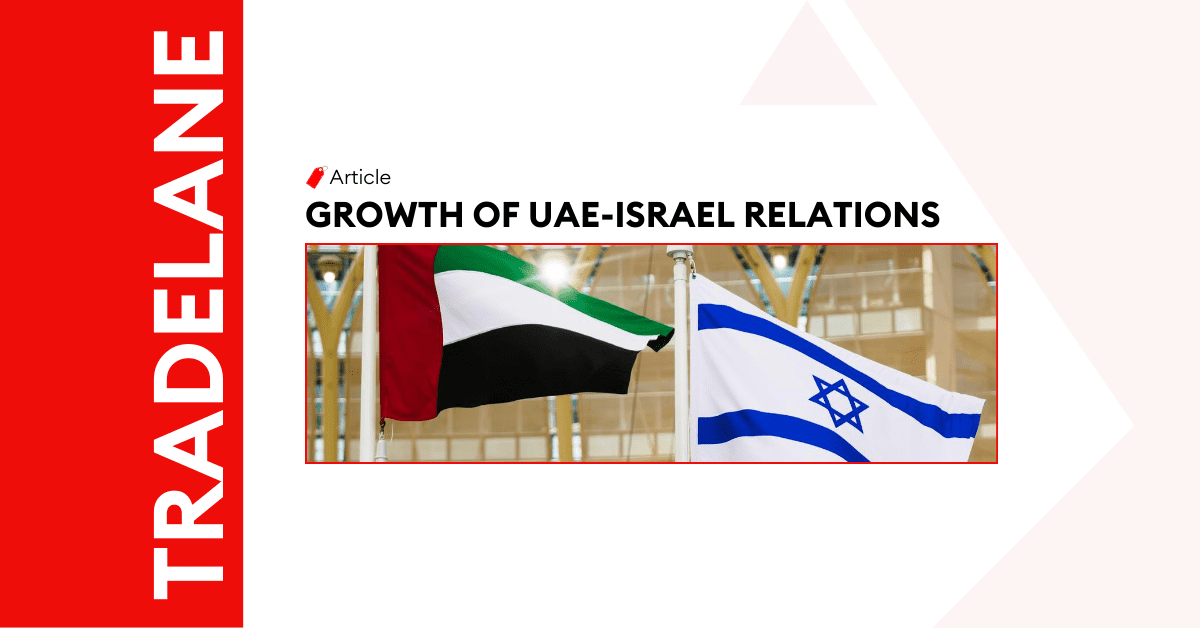
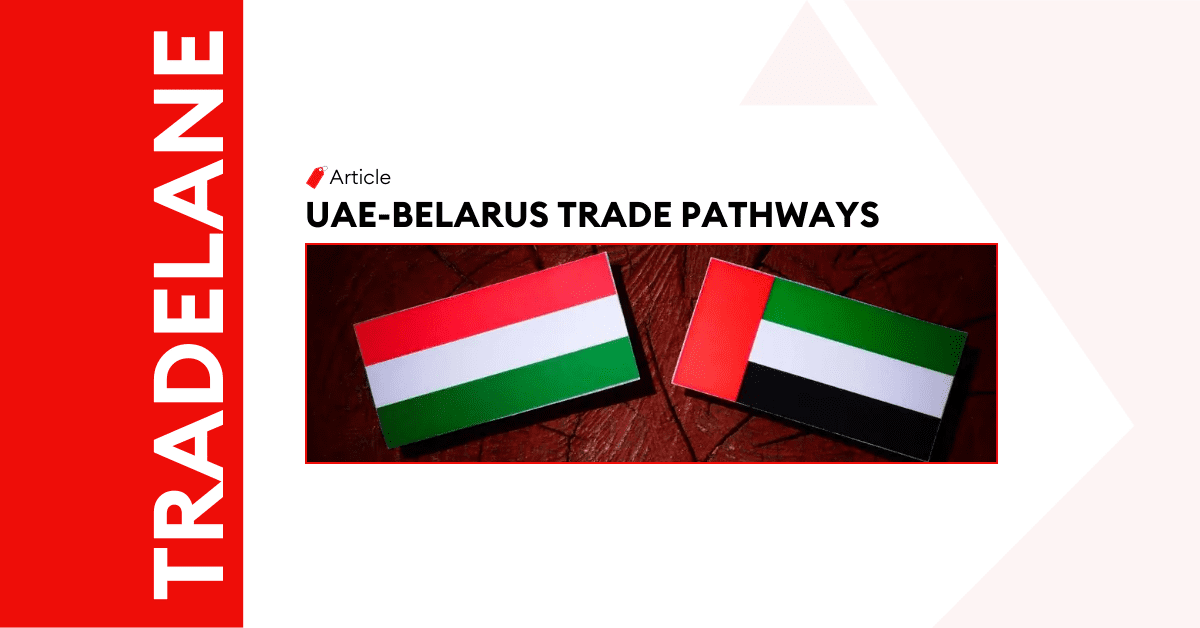
Post a comment
You must be logged in to post a comment.